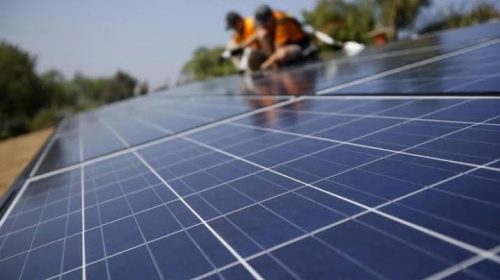Solar Technology Future in Next 20 Years: A Perspective About Pakistan
Govt must continue to incentivize solar energy adoption through subsidies, tax incentives, and favorable tariff structures; solar power will become increasingly accessible to households, businesses, and industries across country
By Mustafa Tahir
As the world grapples with the challenges of climate change, energy security, and sustainable development, solar technology is emerging as a beacon of hope. Over the next 20 years, solar energy is poised to revolutionize the global energy landscape, with Pakistan uniquely positioned to harness its potential. This article explores the future of solar technology, focusing on its implications for Pakistan’s energy sector, economy, and society.
The Evolution of Solar Technology
In the coming two decades, solar technology is expected to undergo significant advancements. Innovations in photovoltaic (PV) cells, such as the development of perovskite solar cells, promise higher efficiency and lower costs. These advancements will likely lead to widespread adoption, making solar energy the most cost-effective and reliable energy source. Additionally, the integration of solar technology with energy storage systems, like batteries, will address intermittency issues, enabling a round-the-clock power supply.
Furthermore, the rise of smart grids and the Internet of Things (IoT) will optimize solar energy distribution, enhancing efficiency and reducing waste. These technologies will allow real-time monitoring and management of energy consumption, empowering consumers to make informed decisions about their energy use. In this scenario, decentralized solar systems, such as rooftop panels and microgrids, will become more prevalent, reducing dependence on centralized power plants and enhancing energy resilience.
Solar Energy in Pakistan: Current Landscape
Pakistan, with its abundant sunlight and favorable climatic conditions, is ideally suited for solar energy development. Over the past decade, the country has made strides in harnessing solar power, with the installation of large-scale solar farms and the proliferation of rooftop solar systems. The government’s initiatives, such as net metering and the Private Power Infrastructure Board (PPIB) formerly Alternative Energy Development Board (AEDB)’s policies, have played a crucial role in promoting solar energy adoption.
However, challenges remain. The high initial costs of solar systems, limited access to financing, and inadequate infrastructure have hindered widespread adoption. Moreover, the lack of awareness and technical expertise among consumers and policymakers has slowed progress. Addressing these challenges will be essential for Pakistan to fully realize the potential of solar technology.
In the next 20 years, solar energy is set to become a cornerstone of Pakistan’s energy mix. As technology advances and costs continue to decline, solar power will become increasingly accessible to households, businesses, and industries across the country. The government’s commitment to renewable energy, coupled with international support and private sector investment, will drive the expansion of solar infrastructure.
- Solar-Powered Industries and Agriculture: Pakistan’s industrial and agricultural sectors, which are heavily reliant on fossil fuels, will gradually get transition to solar energy. Solar-powered irrigation systems will revolutionize agriculture, reducing dependency on diesel pumps and promoting sustainable farming practices. Similarly, industries will adopt solar technology to power their operations, reducing energy costs and carbon emissions.
- Rural Electrification and Energy Access: Solar technology will play a pivotal role in addressing Pakistan’s energy access challenges, particularly in rural and remote areas. Off-grid solar solutions, such as solar home systems and microgrids, will provide reliable and affordable electricity to communities that are not connected to the national grid. This will not only improve the quality of life in these areas but also support economic development and poverty alleviation.
- Economic Growth and Job Creation: The expansion of the solar industry in Pakistan will create significant economic opportunities. The establishment of solar manufacturing plants, EPC (Engineering, Procurement, and Construction) companies, and service providers will generate employment and spur economic growth. Moreover, the development of a skilled workforce in solar technology will position Pakistan as a regional hub for renewable energy expertise.
- Environmental and Social Impact: Widespread adoption of solar technology will contribute to Pakistan’s environmental sustainability goals. By reducing reliance on fossil fuels, solar energy will help mitigate air pollution, reduce greenhouse gas emissions, and combat climate change. Additionally, the social impact of solar energy, particularly in terms of energy access, will be profound, empowering communities and fostering social equity.
Policy and Regulatory Framework: Key to Success
The future success of solar technology in Pakistan will depend on a supportive policy and regulatory framework. The government must continue to incentivize solar energy adoption through subsidies, tax incentives, and favorable tariff structures. Additionally, efforts to streamline the regulatory process and reduce bureaucratic hurdles will be crucial in attracting investment and accelerating project implementation.
Furthermore, public awareness campaigns and educational programs will be essential in fostering a culture of sustainability and encouraging the adoption of solar technology. Collaboration between the government, private sector, and civil society will be key to overcoming challenges and ensuring the long-term success of solar energy in Pakistan.
Conclusion
As the world moves towards a sustainable energy future, solar technology will play a central role in transforming Pakistan’s energy landscape. Over the next 20 years, advancements in solar technology, combined with supportive policies and growing investment, will enable Pakistan to harness its vast solar potential. The result will be a cleaner, more resilient, and equitable energy system that supports economic growth, social development, and environmental sustainability. In this bright future, solar energy will not only power homes and businesses but also illuminate the path towards a prosperous and sustainable Pakistan.
Writer is Deputy Editor Energy Update







